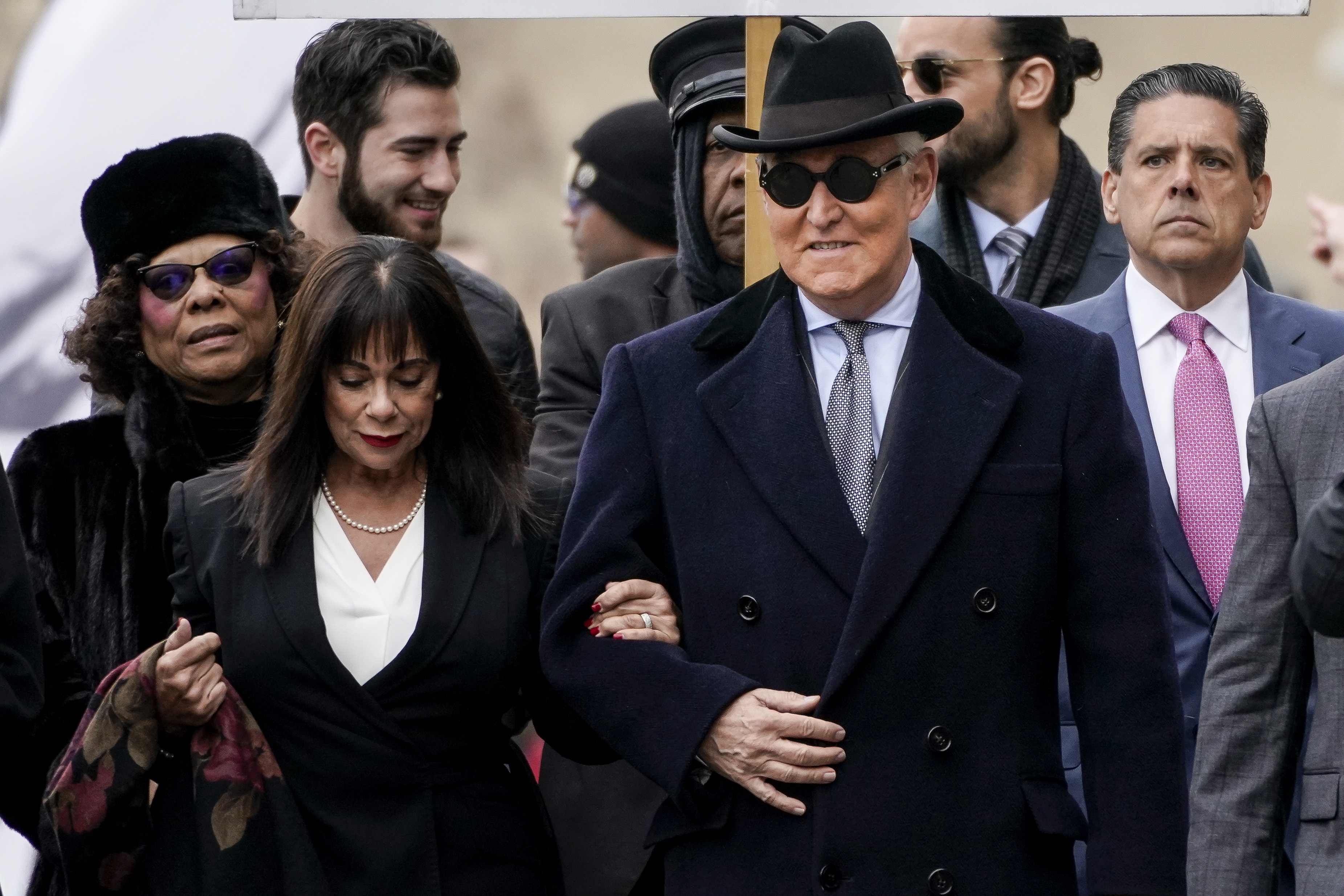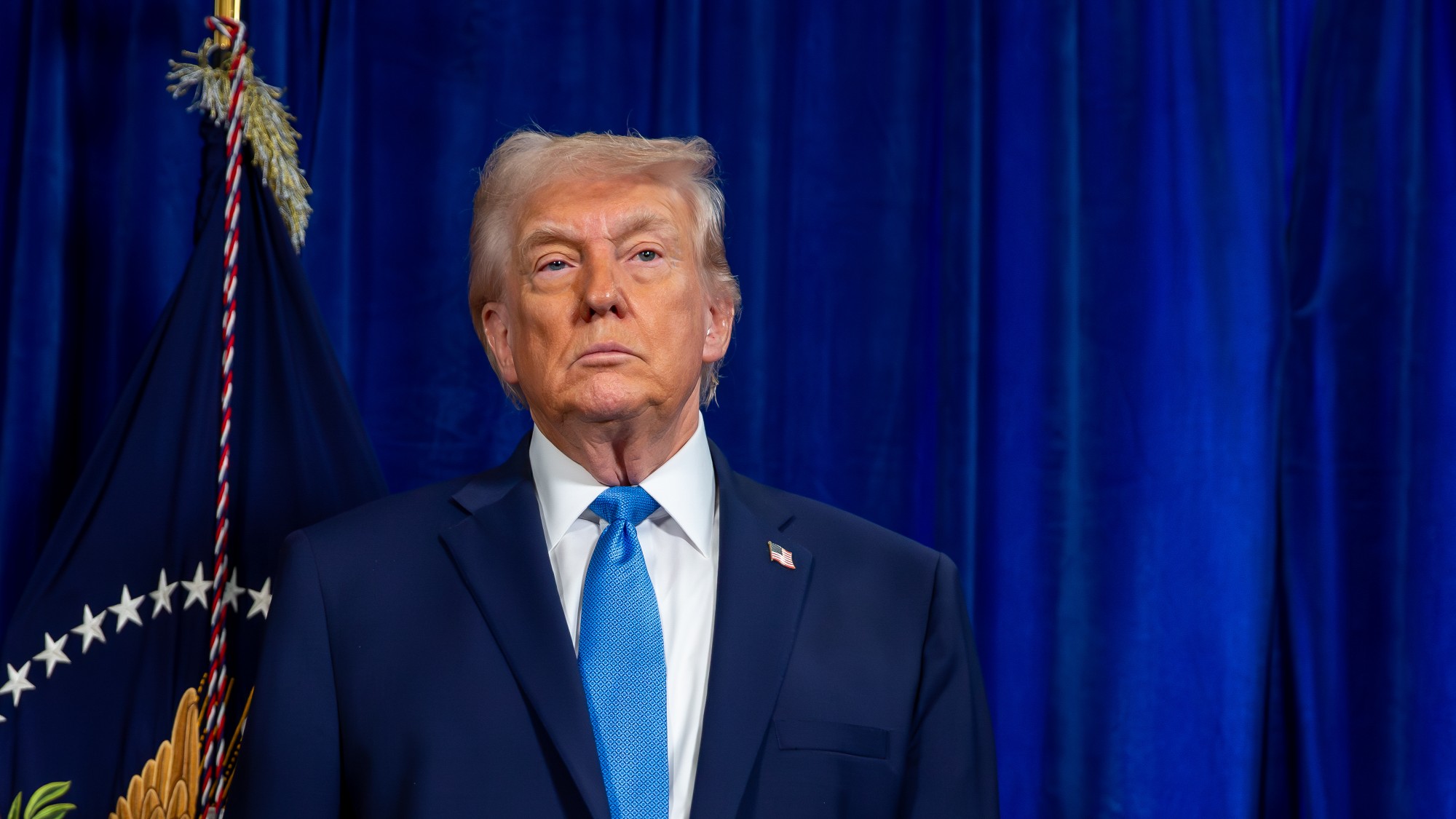Why is Roger Stone’s sentencing so controversial?
The sentence is lower than first proposed, but whether or not that’s Trump’s doing, his efforts to help his ally shocked his critics


A free daily email with the biggest news stories of the day – and the best features from TheWeek.com
You are now subscribed
Your newsletter sign-up was successful
Roger Stone, friend to Donald Trump and self described “dirty trickster” political strategist, has been sentenced to three years and four months in prison for lying to an inquiry by the US Congress in an attempt to protect the president.
Stone, 67, was convicted in late 2019 for lying to Congress, witness tampering, and obstruction of justice. His was the last conviction secured by Robert Mueller’s investigation into Russian interference during the 2016 US presidential election campaign.
Stone was handed 40 months in a federal jail, plus 12 months for another five counts, which will be served concurrently, as well as a $20,000 fine. As he was sentenced he was reprimanded by Judge Amy Berman Jackson, who said his behaviour represented “a threat to our most fundamental institutions, to the very foundation of our democracy.”
The Week
Escape your echo chamber. Get the facts behind the news, plus analysis from multiple perspectives.

Sign up for The Week's Free Newsletters
From our morning news briefing to a weekly Good News Newsletter, get the best of The Week delivered directly to your inbox.
From our morning news briefing to a weekly Good News Newsletter, get the best of The Week delivered directly to your inbox.
As he left the court, he was accompanied by shouts of "lock him up" from the crowd - echoing Trump supporters’ same chant directed at Hillary Clinton.
Nearly two weeks of furor over how the US Justice Department has handled Stone's sentencing preceded yesterday’s final decision, after it reversed its initial sentencing recommendation following President Trump's criticism.
In theory, the work of the Justice Department should be free of political interference, but, by seeking to use his power to protect his friends in legal trouble, Trump has illuminated the reality that this separation is little more than a custom - one that he is willing to challenge.
Why did the judge accept a lower sentence?
A free daily email with the biggest news stories of the day – and the best features from TheWeek.com
Early last week, the four prosecutors whose job it was to propose an appropriate sentence for Stone recommended nine years. The department’s head, the Attorney General William Barr, ordered that recommendation be reduced, however, hours after Trump took to Twitter to criticise it as a “miscarriage of justice”.
With their decision reversed and the president attacking them in public, all four prosecutors resigned in protest.
While she took pains to defend judicial independence and affirm Stone’s guilt, Judge Jackson seemed to agree with Barr on the sentencing question, calling the initial recommendation “greater than necessary.”
Barr says that he made the decision to recommend a lower sentence for Stone - who has a life-size tattoo of Richard Nixon on his back - independent of political pressure, and many accept his position.
“There is no reason not to take Barr at his word that he found the Stone sentencing recommendation to be excessive and acted to correct that,” writes George Terwilliger, former acting attorney general, in The Washington Post.
Judge Jackson agrees, but saying Barr acted acceptably is not to defend Trump for bending the norms governing his office by publicly pressuring the Justice Department. That pressure, said Jackson, was “entirely inappropriate”.
Can the president influence the judicial process?
President Trump’s public commentary on the Justice Department has brought a new level of scrutiny of its decisions, with John Crabb, a prosecutor representing the department, apologising to the judge for the confusion and controversy at the sentencing hearing.
“The Department of Justice and the United States attorney’s office is committed to enforcing the law without fear, favour or political influence,” he said.
The attorney general himself has taken the bold step of coming out and criticising Trump, saying the president’s tweets “make it impossible for me to do my job”.
“I do make his job harder,” Trump said. “I do agree with that. I think that’s true… Social media for me has been very important because it gives me a voice, because I don’t get that voice in the press,” he said. “In the media, I don’t get that voice. So I’m allowed to have a voice.”
Trump “is trying to turn the people charged with federal law enforcement into presidential fixers,” says The New York Times, acknowledging though that there is nothing to stop a president from doing so apart from custom.
“If there is anything useful to draw from Mr. Trump’s degradation of the rule of law and the powers of his office, it’s that he is exposing a critical vulnerability in the Constitution’s design, which anticipated presidents behaving badly, but not this badly,” says the paper’s editorial board.
–––––––––––––––––––––––––––––––For a round-up of the most important stories from around the world - and a concise, refreshing and balanced take on the week’s news agenda - try The Week magazine. Get your first six issues free–––––––––––––––––––––––––––––––
Is Trump protecting loyalists?
The president’s critics have been shocked as an emboldened Trump has punished his perceived opponents and rewarded his loyalists after he was acquitted in his impeachment trial last month.
Their ire grew as Trump attempted to discredit Stone’s trial last week, writing on Twitter that the foreperson in the jury “had significant bias.” The day after Trump tweeted this claim, Stone requested a new trial.
In the early hours of yesterday morning, Trump, who has granted clemency to what The New York Times calls a “rogues’ gallery” of white-collar criminals earlier this week, tweeted a segment from Fox News which claims the chances of him using his presidential powers to pardon Stone were high:
In Las Vegas yesterday, Trump refused to rule out pardoning Stone. “I’m not going to do anything in terms of the great powers bestowed upon a president of the United States, I want the process play out,” he said, referring to the possibility of a retrial.
“At some point I’ll make a determination, but Roger Stone and everybody has to be treated fairly. And this has not been a fair process,” the president said.
It would be incredibly controversial if Trump did pardon Stone. Nobody - the president included - denies Stone lied to Congress. Doing so is a serious criminal offense, but Trump’s defence of Stone is not that he didn’t do it, rather that other people have done it and not been punished - a claim he has not supported with evidence - and that he’s a “character” and a “good person”.
“They said he lied, but other people lied, too,” said Trump yesterday.
The judge affirms Stone’s guilt
“The truth still exists; the truth still matters,” said Judge Jackson.
“Roger Stone’s insistence that it doesn’t, his belligerence, his pride in his own lies are a threat to our most fundamental institutions, to the foundations of our democracy. If it goes unpunished it will not be a victory for one party or another; everyone loses.”
Despite handing out the lower sentence, Judge Jackson did not hold back from tacitly criticising the president. “The dismay and the disgust at the attempts by others to defend his actions as just business as usual in our polarised climate should transcend party,” she said.
��The dismay and disgust at any attempt to interfere with the efforts of prosecutors and members of the judiciary to fulfill their duty should transcend party.”
Stone, said the judge, “was not prosecuted, as some have complained, for standing up for the president,” said the judge. “He was prosecuted for covering up for the president.”
William Gritten is a London-born, New York-based strategist and writer focusing on politics and international affairs.
-
 Touring the vineyards of southern Bolivia
Touring the vineyards of southern BoliviaThe Week Recommends Strongly reminiscent of Andalusia, these vineyards cut deep into the country’s southwest
-
 American empire: a history of US imperial expansion
American empire: a history of US imperial expansionDonald Trump’s 21st century take on the Monroe Doctrine harks back to an earlier era of US interference in Latin America
-
 Elon Musk’s starry mega-merger
Elon Musk’s starry mega-mergerTalking Point SpaceX founder is promising investors a rocket trip to the future – and a sprawling conglomerate to boot
-
 Trump links funding to name on Penn Station
Trump links funding to name on Penn StationSpeed Read Trump “can restart the funding with a snap of his fingers,” a Schumer insider said
-
 Trump reclassifies 50,000 federal jobs to ease firings
Trump reclassifies 50,000 federal jobs to ease firingsSpeed Read The rule strips longstanding job protections from federal workers
-
 Is the Gaza peace plan destined to fail?
Is the Gaza peace plan destined to fail?Today’s Big Question Since the ceasefire agreement in October, the situation in Gaza is still ‘precarious’, with the path to peace facing ‘many obstacles’
-
 Vietnam’s ‘balancing act’ with the US, China and Europe
Vietnam’s ‘balancing act’ with the US, China and EuropeIn the Spotlight Despite decades of ‘steadily improving relations’, Hanoi is still ‘deeply suspicious’ of the US as it tries to ‘diversify’ its options
-
 Trump demands $1B from Harvard, deepening feud
Trump demands $1B from Harvard, deepening feudSpeed Read Trump has continually gone after the university during his second term
-
 Trump’s Kennedy Center closure plan draws ire
Trump’s Kennedy Center closure plan draws ireSpeed Read Trump said he will close the center for two years for ‘renovations’
-
 Trump's ‘weaponization czar’ demoted at DOJ
Trump's ‘weaponization czar’ demoted at DOJSpeed Read Ed Martin lost his title as assistant attorney general
-
 Gabbard faces questions on vote raid, secret complaint
Gabbard faces questions on vote raid, secret complaintSpeed Read This comes as Trump has pushed Republicans to ‘take over’ voting
